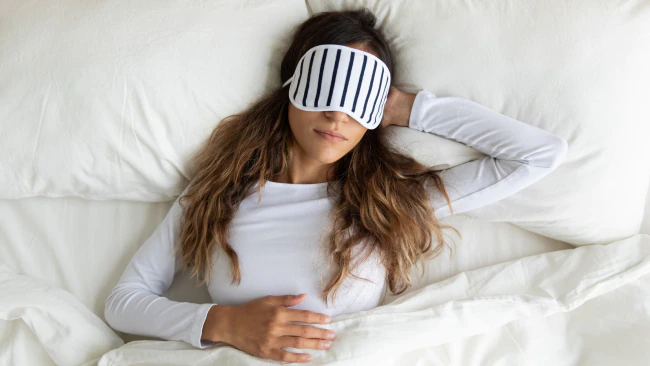Sleep expert Olivia Arezzolo explores unconscious sleep psychology and how it could be sabotaging your rest.
Sleep Well Wednesdays community, prepare for a sleep tip you haven’t heard before.
This isn’t the newest unknown supplement. It’s not the latest ‘must have’ pillow or blanket. And no, it’s not a woo-woo cocktail of sleep supportive herbs to drink before bed.
But – this does make all the difference.
This is an essential consideration for those who are struggling to fall asleep, struggling to stay asleep and feeling unrefreshed upon waking.
Interested? I hope so. It makes all the difference.
So – what is it? This is all based around your psychology of sleep – and it boils down to a few key questions.

1. What is your point of view on feeling rested?
As strange as it sounds, some of us have an inherent fear of being rested. Instead, we champion being fatigued, exhausted and worn out. We wear it like a badge of honour – as in, ‘I’m soooo tired today! I’ve done ABCDEFG – all in the space of a few hours! It’s crazy and I’m super exhausted but I’m proud for smashing through it.”
Sound familiar? If it does – don’t be surprised – this is commonplace in our western society, and to be frank, something that I personally, have struggled with too.
2. Do you believe you are a ‘good sleeper’?
What we believe, we achieve. Some of us feel we are ‘good sleepers’, and reinforce our abilities to fall asleep with ease. On the other hand, some of us shoot ourselves in the foot before we’ve even jumped into bed by identifying as a ‘bad sleeper’.
This is also synonymous with the terms “I can never sleep when I’m stressed” or “Since XXXX, I just can’t get a good night’s sleep”.
We can betray ourselves by labelling ourselves as ‘good’ or ‘bad’ sleepers – it undermines our efforts to sleep well, particularly if you’re in the ‘bad sleeper’ category.

3. Does sleeping well scare you?
For some of my private clients, they admit to a subconscious fear of sleeping well – it means they don’t have an excuse for underachieving or missing their targets.
On the other hand, if you are unable to sleep well, it’s only reasonable you won’t be 100% at work, in relationships or in your personal life – it allows us to omit responsibility.
Again, this seems strange but it’s completely reasonable, especially if you’re one of the high performing, a-types who expects the world of themselves, no matter what. While I could keep going, these key questions raise your awareness of your psychology of sleep – which underpins all the sleep strategies and sleep tips combined.

Regardless of your insights, know that whatever comes up, it can be questioned, repositioned and reframed, by asking yourself it’s validity and reliability.
For example, if you believe you are a bad sleeper, question this with evidence around all the times you are a good sleeper. Find the evidence. Dig, dig, dig. Dig until you find verification of why it’s not true – and then anchor that belief in your psyche with a series of affirmations such as “I am able to sleep well when I have the right supports”.
Psychology doesn’t change overnight, but fortunately, you have a lifetime of sleeping ahead of you to test and see your new belief patterns and systems – and I trust over time, they will be more aligned with you getting your best sleep – each and every night.

+ show Comments
- Hide Comments
add a comment